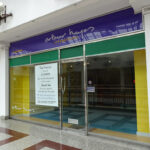JPMorgan’s Chief Global Economist has issued a stark caution about the potential consequences President Donald Trump’s aggressive policy on tariffs, predicting “There will blood.”
Bruce Kasman of JPMorgan, along with a group of company economists, warned in a research note released Thursday that the probability that the global economy will slide into a recession has increased from 40% to an alarming 60% following Wednesday’s announcement of “Liberation Day’ tariffs.
Trump’s sweeping “Liberation Day” tariffs imposes a 10% levy for goods imported into the United States from all countries, with even higher rates imposed on 60 trading partners who have persistent trade deficits.
This includes major economic powers such as China, Japan and the European Union.
These tariffs are on top of the existing duties already imposed by the United States on its top trading partners, Canada and Mexico. This has caused widespread unease.
A shift in US trade policies is making the US less business-friendly
JPMorgan’s Research Note states that “Disruptive US Policies has been recognized as being the biggest risk for the global outlook this year.”
The latest news confirms our fears that US trade policy is now less business-friendly.
The economists of the banking giant characterize tariffs on imported goods as a “functional increase in tax” for US households and businesses.
Economists have warned that Trump’s tariffs plan will likely lead to higher prices on a wide range products, from everyday items like coffee and sugar, to apparel and major purchases like cars and appliances.
The macroeconomic impact of a tax hike of unprecedented proportions
Analysts at JPMorgan calculated that the announcement this week, in combination with earlier tariff increases would raise the average US tax rate by “roughly 22%-pts, to an estimated 24 %,” which is equivalent to about 2.4% of the value of all goods produced within the nation, or GDP.
The JPMorgan research note states that “a hike of this size would be comparable to the largest tax increase since WWII.”
The effects of retaliatory actions from other countries, a decrease in US business sentiment and disruptions to supply chains around the world could be amplified.
Recession on the horizon? JPMorgan raises alarm
“We therefore emphasize that these policies would likely push the US economy and possibly the global economy into recession in this year, if they were sustained.” This is reflected in an update to our probability scenario tree, which raises the risk of a global recession this year from 40% to 60%.
JPMorgan’s economics do offer some hope. They say that a recession in the United States or globally “is not a foregone outcome.”
We continue to stress that, despite the obvious fact that policy may change in the coming week, the US and global expansions are on solid ground and can withstand a small shock.
The note highlights that despite this potential silver lining that JPMorgan’s economics “view full implementation of announced policy as a substantial shock to the macroeconomic system” — a shock that would be hard to recover from if Trump’s policies continue.
This post JPMorgan says Donald Trump’s tariffs could cause ‘blood,’ raising recession risk to 60% can be modified as new information unfolds
This site is for entertainment only. Click here to read more






